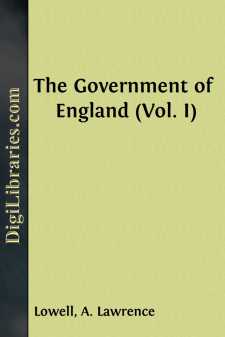Categories
- Antiques & Collectibles 13
- Architecture 36
- Art 48
- Bibles 22
- Biography & Autobiography 813
- Body, Mind & Spirit 142
- Business & Economics 28
- Children's Books 17
- Children's Fiction 14
- Computers 4
- Cooking 94
- Crafts & Hobbies 4
- Drama 346
- Education 46
- Family & Relationships 57
- Fiction 11829
- Games 19
- Gardening 17
- Health & Fitness 34
- History 1377
- House & Home 1
- Humor 147
- Juvenile Fiction 1873
- Juvenile Nonfiction 202
- Language Arts & Disciplines 88
- Law 16
- Literary Collections 686
- Literary Criticism 179
- Mathematics 13
- Medical 41
- Music 40
- Nature 179
- Non-Classifiable 1768
- Performing Arts 7
- Periodicals 1453
- Philosophy 64
- Photography 2
- Poetry 896
- Political Science 203
- Psychology 42
- Reference 154
- Religion 513
- Science 126
- Self-Help 84
- Social Science 81
- Sports & Recreation 34
- Study Aids 3
- Technology & Engineering 59
- Transportation 23
- Travel 463
- True Crime 29
The Government of England (Vol. I)
Description:
Excerpt
PREFACE
Measured by the standards of duration, absence of violent commotions, maintenance of law and order, general prosperity and contentment of the people, and by the extent of its influence on the institutions and political thought of other lands, the English government has been one of the most remarkable the world has ever known. An attempt, therefore, to study it at any salient epoch cannot be valueless; and the present is a salient epoch, for the nation has now enjoyed something very near to manhood suffrage in the boroughs for forty years, and throughout the country more than twenty years, a period long enough for democracy to produce its primary if not its ultimate effects. Moreover, England has one of the most interesting of popular governments, because it has had a free development, little hampered by rigid constitutional devices. It is an organism constantly adapting itself to its environment, and hence in full harmony with national conditions. An endeavour has been made in these volumes to portray the present form of that organism and the forces which maintain its equilibrium.
In preparing a study of this kind one feels the need of limiting its scope, by reducing the denominator as Arthur Helps remarked. Hence the work covers only the English government as it stands to-day; and further, only those institutions, national and local, that have a general bearing. The British Constitution is full of exceptions, of local customs and special acts with which town clerks must be familiar. They fill the path of these men with pitfalls, but they do not affect seriously the general principles of the government, and no attempt is made to describe them here. Even the institutions of Scotland and Ireland, interesting as they are in themselves, have been referred to only so far as they relate to the national government or throw light upon its working.
Even so limited, the subject is not without difficulties. The forces to be studied do not lie upon the surface, and some of them are not described in any document or found in any treatise. They can be learned only from men connected with the machinery of public life. A student must, therefore, rely largely upon conversations which he can use but cannot cite as authorities, and the soundness of his conclusions must be measured less by his references in footnotes than by the judgment of the small portion of the public that knows at first-hand the things whereof he speaks. The precise effect of the various forces at work must be a matter of opinion on which well-informed people may differ, and the writer has drawn the picture as it appeared to him.
To undertake a study of this kind would be impossible without manifold assistance from others; and the writer is glad of this chance to express his sense of obligation to the many persons who have given him help and information, men in public life belonging to different parties, permanent officials, national and local, officers of political associations, jurists, publicists and many others....


